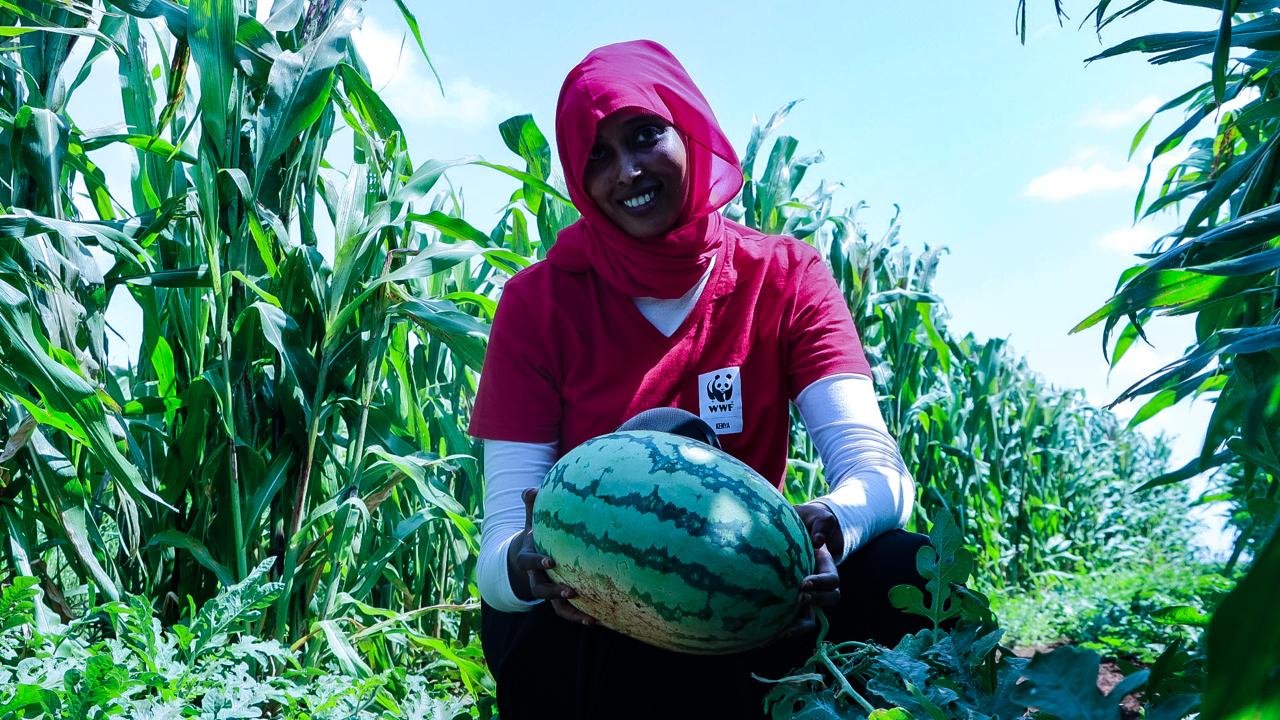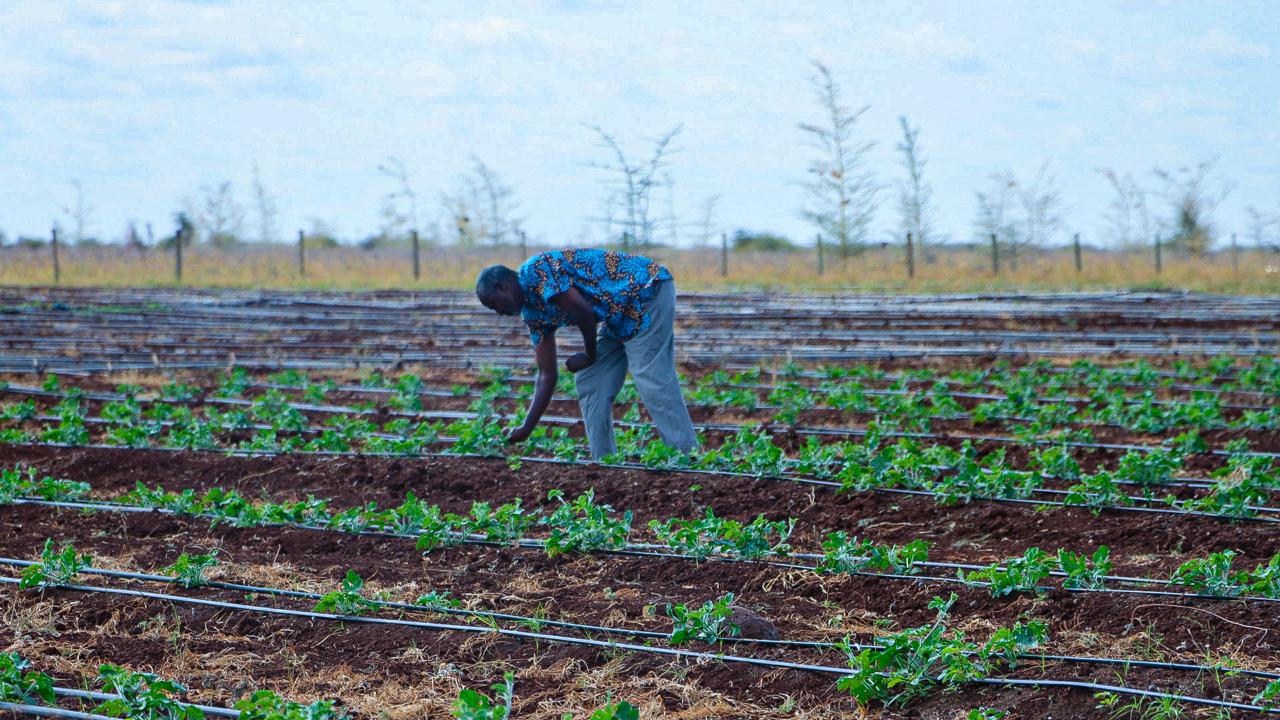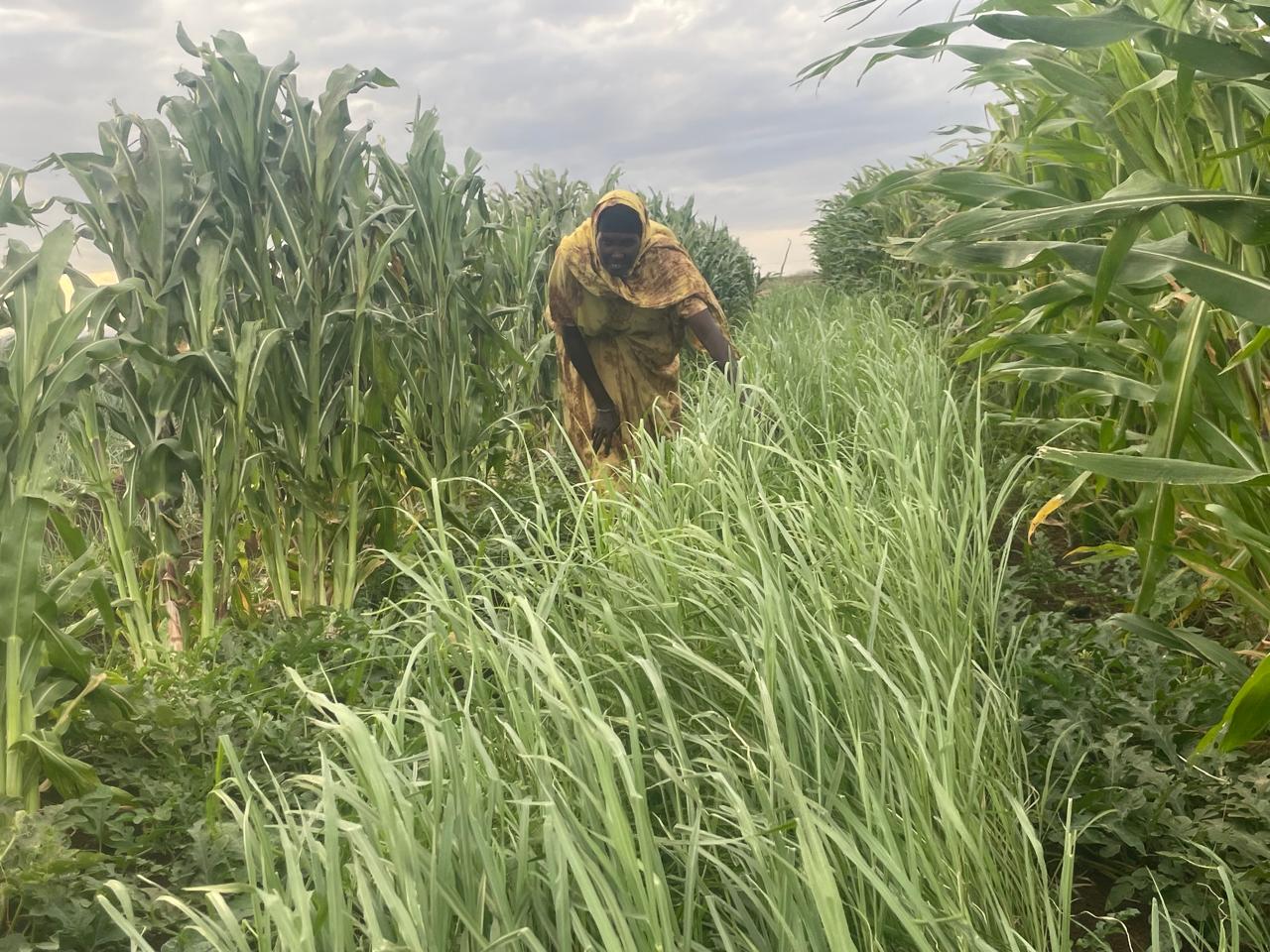

Ahadho Guyo at the farm in Marsabit county /GILBERT KOECH
A visit to the remotest parts of Marsabit county evokes emotions, as it remains one of the regions characterised by limited resources, often experiencing persistent poverty and underdevelopment due to factors like remoteness, lack of infrastructure and climate vulnerability.
This sorry state is, however, changing, as a new climate-smart farm has taken shape at Shurr Conservancy, creating an oasis in the middle of a desert.
“We have for a long time depended on livestock such as cattle, goats and camels. They are, however, wiped out every time there is a drought, leaving us desolate,” Arbe Abudo, 52, a member of the conservancy, said.
The community say they are often forced to rely on food relief every time there is a drought, which has stripped them of their dignity.
In 2023, the National Drought Management Authority announced that Marsabit and Kajiado counties had lost more than 40 per cent of their livestock to drought.
NDMA statistics showed that since the start of the drought, more than 2.6 million herds of cattle, sheep, goats and camels had died in the 23 arid and semi-arid land counties.
The other affected counties were Isiolo, Samburu, Turkana, Wajir and Mandera.
Abudo, a resident of Shurr, Turbi ward in North Horr subcounty, Marsabit county, is also a member of the Shurr Conservancy Women’s Group.
She said the climate-smart project will return the dignity they had lost following devastating losses associated with the drought.
Abudo said they have nowhere to turn every time the drought wipes out their livelihoods.
“We are confident today, as we have an alternative source of livelihood,” she says with a smile from her manyatta.
She, like other members from the Conservancy, is elated that a new 40-acre smart farm, now operationalised, will go a long way in building self-reliance through sustainable farming techniques.
The project, which seeks to improve food production and long-term community resilience in arid regions, is supported under the Voices for Just Climate Action programme.
It focuses on empowering Indigenous communities in Shurr to secure their rights to natural resources, improve their livelihoods and protect their natural heritage.

Shurr Conservancy's former Chair, Stephen Hoko, checks the irrigation line within the farm.
The project addresses the impacts of climate change in a dry-land context by building the community’s resilience through practical, locally driven solutions that blend traditional knowledge and climate-smart innovation.
The main objective is to catalyse and amplify community voices in climate discourse and practice, using local resources and governance to promote adaptation and sustainable land use.
Within the farm, a number of crops are blossoming under drip irrigation.
In Block A1, a quarter of an acre blossoms with onions that are set to be harvested in a few days.
Block B1, which is half an acre, hosts watermelons, while Block A2 also hosts watermelons in a quarter of an acre.
Block A3 hosts watermelons on half an acre, while Block B2 hosts butternut on an acre. Sorghum has also been integrated into the farm.
The farm has since been secured with a solar-powered fence to keep wildlife at bay. Out of the 40 acres secured, close to 20 acres have been tilled in readiness to accommodate more crops, in efforts to change the area from a desert to an oasis.
To ensure sustainability, the crops grown have been linked to a market which is close to 70 kilometres from Marsabit town.
Biodiversity, research and innovation manager at the World Wide Fund for Nature-Kenya, Dr Yussuf Wato, said his organisation helped drill and install the borehole at a cost of Sh20 million. “This is a very arid area with erratic rainfall and experiences prolonged drought. There are a lot of negative impacts because the communities lost 80 per cent of their livestock during the recent drought that happened between 2018 and 2022,” Wato said.
WWF-K’s intention was to provide water for wildlife, livestock and communities.
“We sunk a borehole, and luckily it had very high productivity and yield. We installed a solar-powered pump on the borehole and we pumped some water for wildlife, away from where communities live.”
Wato said they noticed that the yield from the borehole was high and could support other nature-based enterprises, leading to the idea of climate-smart agriculture.
He said the land is fertile and communities have livestock that can provide manure.
Wato said they partnered with specialised institutions such as the Kenya Agriculture and Livestock Research Organisation, who are experts in crop production, soil analysis and irrigation design.
The Water Resource Authority helped with how to optimally use water from the borehole. Other partners in the project include the Marsabit Wildlife Conservancies Association (Mawica), the local community of Shurr and the Pastoralist Initiative Support Programme.
Wato said the community has also been supported to set up an apiary with 100 beehives as part of building their resilience and having an alternative source of livelihoods. Some 60 energy-saving jikos have also been distributed to help reduce the need for firewood and improve health outcomes. Poultry farming for women is also being supported.
Kalro director in charge of the Beef Research Institute, Dr Tura Isako, said they will build the capacity of the communities on various aspects of agriculture, including integrated pest management for such farms.
“You know that this rangeland is a very fragile ecosystem and the communities that live in this area are pastoralists. They are not used to farming, but climate change has necessitated such an initiative,” Isako said, adding that agriculture can be practised in arid and semi-arid areas with the right technologies.
WWF-Kenya Africa's Food Future initiative lead, Nancy Rapando, echoed Isako’s sentiments, saying the community can now cope with the impacts of climate by diversifying.
“This climate-smart farm, when it comes to resolving food security issues, ensures that there is a stable supply of food in this community because it's big enough to provide that food.”
Rapando said the project will also help improve food nutrition.
Edin Kala, Mawica’s CEO, said wildlife resources must benefit communities.
Mawica is an umbrella regional organisation whose formation was necessitated by the growth of conservancies' numbers in Marsabit county. There are eight conservancies in the county.
Pastoralist Integrated Support Programme CEO, Katelo Guyo, said the idea of the farm is a result of the experience of severe drought in 2020–2022 that killed hundreds of livestock as well as wildlife species.
“Five seasons failed, which affected the pastoralist communities, wildlife and the entire environment, affecting the livelihoods of the communities,” Guyo said donor funding for the conservancies has also shrunk.














